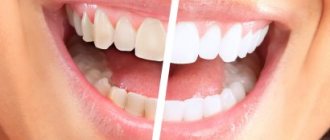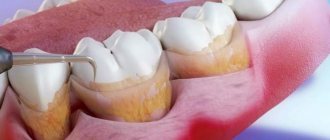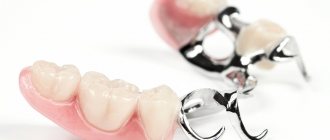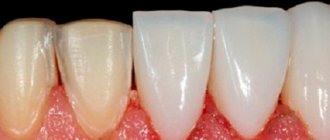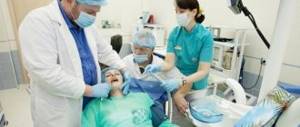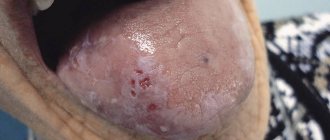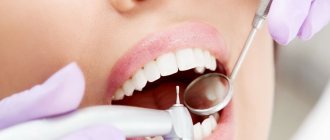Implantation, like any type of surgical intervention, has its contraindications, in the presence of which the doctor may refuse this procedure to a visitor to the dental office. If the client has expressed a desire to have implants installed, he is offered to undergo an examination and tests that will help identify contraindications to implantation, if any, and prevent health problems. There are several categories of contraindications, ranging from absolute, when installing implants is completely impossible, to temporary, when the procedure can be performed after a period of time or it is necessary to first eliminate existing health problems.
Classification of prostheses
The choice of type of prosthetics largely depends on the specific problem and is carried out exclusively by professional doctors. However, it would be useful for patients to know what prostheses can be offered to them. The classification of dentures is based on the nature of their fixation in the oral cavity and assumes the following types:
- Fixed. They differ in that they are designed for full fixation in the patient’s mouth and are worn constantly. They are used both in the case of single and in the presence of significant defects in the dentition. Often, cementing materials are used to fix prostheses in this category. Specific types of fixed prosthetic elements are bridges, as well as crowns and partial crowns.
- Removable. They are often used in cases where most of the teeth are missing from the jaw. However, they are not “tightly” attached, and therefore, if necessary, they can be removed from the mouth. This category includes partial, conditionally and completely removable dentures.
- Combined. This type of orthopedic products is a mixture of the previous two and is characterized by the presence of both removable and permanent elements.
Contraindications and indications for dental prosthetics exist in each of the above cases and can become a decisive point in choosing a specific type of prosthesis.
Preparing for dental implantation
The first stage is a visual examination by a dentist, which determines the presence of visible deficiencies and contraindications. After this, he may refer you for an x-ray or tomography of the jaw. This helps to identify “pitfalls” that cannot be seen with the naked eye. Tomography also helps to correctly determine the location of the implant, especially if the patient has a limited space, bone atrophy and other violations of the integrity of the gums. The doctor needs to know the location of the maxillary sinuses and their condition if work is carried out on the upper jaw. If the result is positive, 3D modeling is used to select an anatomically suitable prosthesis.
The main task of a specialist is to be completely sure that there are no contraindications to surgical intervention. This will help prevent complications and provide quality preparation for implantation. That is why preoperative preparation is given such great importance. It includes tests and, if necessary, additional examination by specialized doctors.
The patient is also involved in the implantation. He needs to be honest with his dentist and talk about diseases that are included in the group of relative and absolute contraindications. Hiding such details can lead to the most complex complications, rejection of the prosthesis and the inability to re-implant. That is why preparation for treatment is the most important stage. Cooperation with an implantologist will help to carry out the operation successfully with minimal risks.
Calculator: calculate prices online
Turnkey implantation
Calculate the cost of turnkey dental implantation yourself.
The price includes: the implant itself + installation work + consumables + gum former. Select an implant
0
Specify the required number of implants
Select crown type
+Installation of an abutment on the implant is additionally paid: 1 abutment is required for one crown. The cost of 1 abutment is 4000 rubles.
Installation of an implant with simultaneous tooth extraction. If it is necessary to install an implant, remove the tooth first and immediately place the implant. Cost 5000 rub.
Specify the number of deletions
Better and more accurate - in a free consultation! All addresses and telephone numbers are on the website chudostom.ru. Make an appointment by calling the branch closest to you.
The calculation is not a public offer; the final cost is determined at a free consultation BEFORE the start and does not change during the treatment process.
Total cost rub.
0
Contraindications and indications for dental prosthetics
Before prescribing this procedure to a patient, the dentist must consider possible contraindications and indications for dental prosthetics. The procedure is indicated in the following cases:
- Pathological tendency to abrasion of teeth. To correct the problem, veneers or crowns are mainly used.
- High degree of destruction of the tooth crown. It is a consequence of advanced caries or pulpitis. Treatment requires the use of inlays and crowns.
- Completely destroyed dental crown. We are talking about a case when only the root remains of a tooth in the mouth. This requires the use of pins.
- Missing one tooth. This defect is not considered a direct indication for prosthetics, but with certain accompanying factors it is required. Prostheses of various designs are used.
- Numerous dental defects. In such cases, removable prosthetics are most often performed.
It is worth noting that contraindications to removable prosthetics are few and mainly come down to the presence of acute diseases in the oral cavity. In the case of fixed dentures, the picture is completely different. The main obstacles to this procedure are:
- diseases of the jaw bone tissue and acute inflammatory processes in the oral cavity;
- general inflammatory processes, diseases in the acute stage;
- acute stress, mental illness;
- intolerance to painkillers, taking medications incompatible with anesthesia.
In addition, a permanent prosthesis is unlikely to be prescribed to pregnant women, drug addicts, and patients at the stage of rehabilitation after serious illnesses. An equally important reason to deny a person permanent prosthetics is the fact of insufficient hygiene - both of the whole body and the oral cavity itself.
Author:
For what diseases is implantation absolutely contraindicated?
- HIV infection at any stage of development.
- Oncology: malignant tumor, cancerous formations or lumps, sarcoma, neoplasms in the metastatic stage.
- Metal intolerance.
- Any blood diseases (thalassemia, leukemia, lymphogranulomatosis and others).
- Somatic pathologies of chronic course: tuberculosis, diabetes, diseases of the oral mucosa.
- Diseases of the immune system that will interfere with tissue healing: polymyositis, thymic hypoplasia and others.
- Ailments associated with the condition of connective tissue: lupus erythematosus, scleroderma, rheumatic and rheumatoid diseases.
- Hypertonicity of masticatory muscle tissue, bruxism.
- Diseases of the mucous membrane: Sjogren's syndrome, pemphigus, aphthous stomatitis.
- Endocrine disorders: abnormal state of the adrenal glands, pituitary gland, hypothyroidism, hypoparathyroidism, hyperthyroidism, hyperparathyroidism.
- Problems with bone tissue regeneration: dysplasia, osteoporosis, osteonecrosis, osteopathy.
- Diseases associated with the heart and blood vessels.
- Mental disorders: schizophrenia, paranoia, dementia, psychosis.
- Alcohol and drug addiction in the final stages.
If there are absolute contraindications, a person cannot use the implant installation service, otherwise a deterioration of the condition, accelerated development of the existing pathology, or death may follow.
Tooth extraction under anesthesia
Anesthesia in dentistry is performed for the treatment of both adult patients and children for the purpose of therapeutic, surgical (tooth extraction, implantation, etc.) dental care.
The essence of sedation is that while the drug is administered the patient is asleep, after the drug is stopped, its effect ends in about 4 minutes. The drug is administered for medical sedation using a special syringe dispenser. To minimize the dose and eliminate negative consequences, conduction anesthesia is performed in parallel.
The anesthesiologist monitors the patient’s condition visually and through a special patient monitor, which records pulse, respiratory rate, blood oxygen saturation level, body temperature, and, if necessary, blood pressure and ECG. To ensure the safety of the activities being carried out, the rooms are equipped with a medical suction device, a defibrillator, an anesthesia-respiratory apparatus, and oxygen is also supplied.
Possible complications after implantation
After surgery, pain is a natural reaction of the body. Usually the discomfort goes away after 5-7 days. If the pain does not go away after a week, this may be a sign of a complication developing. In this case, consult a doctor.
The most common complications:
- Pain.
The body's natural reaction to surgery (should subside after 5 days). - Numbness.
Appears after anesthesia (disappears 3-4 hours after surgery). - Bleeding.
If it does not go away within 3-4 days after installation, consult a doctor. - Temperature.
An increase to 37 degrees is possible (if it lasts more than 4 days or rises higher, you need to consult an implantologist). - Reimplantitis.
The most serious complication, which is expressed in inflammation of the tissue around the artificial root. Occurs due to infection or poor oral hygiene and can lead to rejection.
Contraindications
- Pregnancy and breastfeeding period
- Alcohol or drug addiction
- Presence of mental illness or traumatic brain injury
- Individual intolerance to drugs used during the sedation procedure
- The patient has neuromuscular diseases (myotonia, myopathy, botulism, etc.), as well as chronic lung diseases
- Infectious diseases accompanied by high fever
- Bronchial asthma and diseases of the circulatory system
- For various types of bleeding (including the menstrual cycle)
- Children under 3 years old
Sedation should also not be performed on a full stomach, as this may cause dizziness and nausea. If you think that this procedure is simply vital for you, it’s time to make an appointment with a specialist. An experienced dentist in Minsk will help you treat your teeth without fear and pain, and most importantly, efficiently and quickly. Call the numbers listed on our website and we will answer all your questions!
Relative
For women
During pregnancy and lactation, no surgery is performed. During pregnancy, a woman’s bone composition changes, and during lactation, calcium loss occurs. This can lead to mobility of the structure.
During menstruation, surgery is not planned because there is a significant decrease in platelet levels (almost 2 times).
And during menopause, the dentist must conduct an extensive diagnosis, and also take into account the patient’s health condition.
Local contraindications
Diseases of the oral cavity and teeth. For example, if you have gum disease or caries, they need to be treated, and after that you can begin the procedure for installing a titanium rod. If you have malocclusions or abnormal jaw structure, it will take more time, because the dentist will recommend correcting these defects with braces or aligners.
Diabetes
Diabetes mellitus causes metabolic disorders and decreases bone density, so it is not recommended to plan the installation of implants. However, in case of decompensated diabetes (at least 2-3 months, or better yet a year, the sugar level was no more than 6 mmol), implantation using All-on-4 and All-on-6 technology is possible.
To minimize the number of surgical interventions, one-stage implantation is recommended for patients with diabetes (the titanium root is installed through a puncture of the gum, without incisions or sutures). If these parameters are observed, as well as diabetes is controlled, engraftment will take place as standard.
Bone diseases
Implantation of titanium rods is contraindicated if the patient has diseases of the skeletal system: osteoporosis, osteopathy, osteonecrosis and dysplasia. These diseases interfere with the formation of bone tissue, which is why it is not able to support the artificial root (high risk of rejection or complications). Bone volume can be restored using osteoplasty.
Implantation for hepatitis
The operation is performed depending on the stage of the disease. For hepatitis B and C, surgery is not recommended because there is a risk of prolonged bleeding.
If the patient has hepatitis, it is necessary to take a blood test with a leukocyte formula to determine the level of blood clotting. Surgery is not planned while the patient is taking medication. Most often, one-stage implantation is used.
Aesthetic consequences of loss of bone volume due to missing teeth
The facial changes that naturally occur with age can be exacerbated and accelerated by tooth loss. Pronounced aesthetic consequences result from loss of alveolar bone. Patients do not even suspect that all these changes in soft tissues are associated with tooth loss:
- Reduction in facial height occurs due to disturbances in the vertical dimension of the alveolar bone.
- A change in the labiomental angle and deepening of the vertical lines in this area give the face a rougher appearance.
- A malocclusion develops. As a result, the chin turns forward.
- The corners of the lips droop, the patient's face has an unhappy expression.
- Due to poor support of the lip by dentures and loss of muscle tone, the border of the red border of the lips becomes thinner.
- Age-related deepening of the nasolabial philtrum and other vertical lines on the upper lip is more pronounced with loss of bone volume.
- In edentulous patients, the decrease in the tone of the facial muscles that support the upper lip occurs faster, and the lengthening of the lip occurs at an earlier age. As a result, the smile ages.
- Bone atrophy has a negative effect on the attachment of the mental and buccal muscles to the body of the mandible. The fabric sags, creating a double chin. This effect is caused by decreased muscle tone when teeth are lost.
Absolute
It is strictly forbidden to perform surgery if the patient has various forms of blood disease. This is a general parameter that limits any surgical operation and even simple tooth extraction. The main reason is blood incoagulability, possible blood loss or infection. If you have poor circulation, leukemia, hemophilia, anemia or lymphogranulomatosis, notify your doctor at your first consultation. Perhaps the dentist will choose another method of dental prosthetics that will not be critical.
If you are allergic to anesthetics, titanium rods are not installed. Because painkillers can put the patient into anaphylactic shock during surgery.
Oncological diseases are another criterion by which a patient is most often denied implantation. After radiation therapy, bone tissue atrophy occurs, which makes installation of a titanium rod difficult. If the cancer is in complete remission, the dentist will consult with the attending physician and decide on the possibility of implant prosthetics.
Why does discomfort occur?
A person with missing teeth gets used to living without them. His dental system begins to distribute the chewing load differently, and the muscles, cheeks, nerves, tongue and jaw bones involved in the process gradually get used to the restructuring that has occurred.
If missing teeth can be restored with permanent dentures, the parameters of which are almost identical to natural teeth, the load when chewing food turns out to be natural. And the absence of foreign elements - fixing hooks and staples - guarantees the absence of irritation of the mucous membranes of the cheeks and tongue.
In removable structures, the chewing load is distributed differently. For example, popular clasp dentures distribute it to the palate and the remaining adjacent teeth. It is clear that the sensations when chewing food will be unusual at first and will almost certainly cause irritation.
Prosthetics is a competent solution to many problems
Dental prosthetics is a completely common procedure today, which has long been carried out by orthopedic dentists on a routine basis. Prosthetics have already helped millions of people - indeed, it is difficult to imagine what would have happened if humanity had not yet learned to replace lost or damaged teeth with artificial analogues. Prosthetics solves several problems at once - maintaining the aesthetics of our smile, which plays an important role for self-esteem and psychological comfort, restoring the chewing function of the teeth, which supports our health, as well as preserving speech function, because diction and beauty of speech directly depend on the condition of the speech apparatus , of which the teeth are a part.
